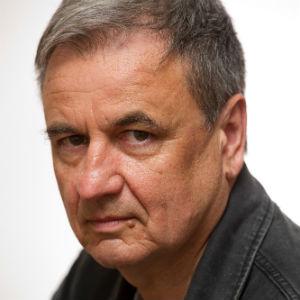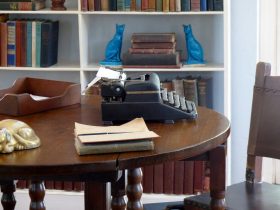Martin Langford Martin has published six books of poetry, including The Human Project: New and Selected Poems and Microtexts, and edited Harbour City Poems: Sydney in Verse 1788-2008. He is a previous director of the Australian Poetry Festival. He is on the judging panel for the 2012 Blake Poetry Prize.
What did you want to be when you grew up?
I liked language from early on – from, say, my late teens – and it wasn’t long, perhaps early twenties, before that turned into a preference for poetry. I’m not sure why poetry and not prose: narrative and poetry speak to different impulses – at least narrative and lyric poetry do, and I’m not sure why I chose the one and not the other. I have a liking for embodied language, and for the way poetry leads the reader out into the moment rather than on towards a point of arrival. For me, it has always seemed like the natural and logical response – though one might also mention music, dance, science: anything curious and attentive, or embodied, or both.
When did you know you would work in the arts?
Poets don’t exactly “work in the arts”. They try to survive financially while staying close enough to the poetry to keep it alive as a possibility. Sometimes this can mean that their work develops fitfully because they only get to give it their full attention now and again, and it can be difficult for them to maintain the creative spaces to be able to see it honestly in – but I imagine all art forms develop obstacles to prevent one from staying close enough to the work.
How would you describe your work to a complete stranger?
Mostly, I write lyric free verse. I try to be lucid. I prefer language which is musical. In free verse, that usually means trying to tease out the pauses and emphases which are already present in speech – though there are many variations to that. I don’t mind poems simply being intellectual or clever – sometimes it is the only way to say something – but it is always more difficult to make the play of understandings inflect into emotion. One goes to the arts because they offer emotion as well as intellect – or at least I do.
In terms of beliefs and recurring interests: I tend to see a lot of our behaviour in terms of our biological inheritance; one way of thinking of society is as an attempt to manage this. Two aspects of it which I find particularly difficult are our passion for hierarchy, which is relentless, Protean and collusively ignored; and the way we express this passion in terms of the enlargement narratives which saturate our culture. “The Human Project” was a suite of poems which explored this, and my current work is an attempt to think about the way such things have played out specifically in Australia.
For a lyric poet, I have a fair rational streak. I’m a creature of my culture insofar as I am suspicious of anything which isn’t evidence-based. That said, just because science has shown the world to be consistent doesn’t mean that it isn’t also strange. I would like to turn that strangeness into a music which is compelling in a poetic way, not just a scrappy adaptation of scientific ideas.
As well as poetry, I have written aphorisms, poetics and essays.
Is there a mission to your work?
I would love to see better spaces for poetry in Australia. The poetry is an important national achievement, and it is just about invisible. That is a separate issue, however, to my own creative work.
What’s your background – what did you study to get to where you are?
I did a Leavisite BA at Macquarie in the seventies, tried doing my honours year twice, but had to leave to support a young family. I’ve probably had an ambivalent attitude towards the universities since: there are clearly all sorts of interesting conversations going on in them; at the same time, some university-based criticism is locked in a kind of rivalry with the arts – there are some voices there who would prefer it if the arts didn’t exist – or, rather, existed only as gutted exemplars. I taught secondary school for twenty-five years, taking leave without pay whenever I could; I resigned in the late nineties, and have been involved in poetry in one way or another since then.
What’s the first thing career related you usually do each day?
I read someone else’s work – usually, in recent years, Australian. I am interested in the question of what we have achieved. The reading feeds critically into my own work, insofar as collectively it represents the conversations that my own work will enter: it can help one to see what one is doing, but the way in which it prompts creative ideas is more elusive. It does do that as well, however.
Can you describe an “average” working day for you?
I tend to work during the day; there’ll be some reading, and a walk in there somewhere.
What’s the one thing – piece of equipment, toy, security blanket, – you can’t work without?
Pen and paper – at least to get to the thing in the first place. The pen is an extension of the body. The keyboard isn’t. I can edit on line, but not conceive.
What gets you fired up?
Positively: music can; places; different images at different times, according to what I might be thinking about; the gestures that people make – and that writers like to mull over. Negatively: it is hard not to be dismayed by the improbable representations of interest which constitute our public life, and which the electorate is apparently so keen to believe.
Who in the industry most inspires you?
Anyone strong enough to listen to their own responses.
What in the industry do you despair about?
The cultural space that poetry projects into. Most art-forms generate circuses of associated momentum which nevertheless earn them some good spaces to work in: poetry happens not to have any of these auxiliary engines – it doesn’t commodify well (you can’t hang a twenty-dollar poetry book on a boardroom wall), it turns brittle if you try to make it sexy, it resists the simplifications of copy. There are advantages in this – it has been protected from some of the excesses which other arts have been plagued by – but it would be nice to work in a more responsive space. The quality is equal to anything else out there, but hardly anyone knows about it. There are some reading-skills issues, which people aren’t very honest about, and it is probably true that few other art-forms are so demanding of one’s attention – one either gets the whole poem, or one gets nothing – but for all that, poetry should simply be a part of everyone’s arts menu.
What is the best thing about your job?
I think people in all art-forms feel it is a privilege to have access to a field of engagement with the world beyond them – in my case, poetry.
What’s the worst?
In all obsessive pursuits – probably in all careers – there is the unsolvable question of what one owes to one’s others, and what one owes to oneself. Unlike some activities, one can hardly justify one’s life in poetry by pointing to the money.
What are the top three skills you need in this industry?
I’m not sure that poetry is enough of an industry to talk meaningfully about the decisions and skills one needs to operate in it. Hopefully, Australian Poetry (the new poetry organisation) can provide some infrastructure for poets – but conversations about the reading and the work are always going to be central to the way verse plays out.
In terms of artistic skills: apart from writing, poets need to be good readers. And while not absoutely essential, it has become pretty important to be able to present one’s work to an audience.
What advice would you give anyone looking to break into your field?
I can’t imagine anyone wanting to be a poet who doesn’t have an eroticised fascination with words and meanings. One occasionally comes across people who strike one as lacking this, and wonder why they ever became involved. Sometimes, they are the ones who network furiously, and whose angers rigidify as they get older. Make sure you love the stuff.
How do you know when you missed the mark?
There are so many ways! There are all the craft ways, and they’re hard enough: making sure you’ve solved the expressive issues in a particular poem. But there are also the issues around what is worth doing. When one is working on a poem, one is not necessarily considering whether what one is saying is worth exploring. One gets a little better at making calls about this with practice, but it’s a perennial problem, and I think it’s a problem for everyone.
Which of the below phrases best suits your career development to date and why?
a. “The road to success is always under construction. ”
b. “Opportunity dances with those who are already on the dance floor.”
c. “Success is best measured by how far you’ve come with the talents you’ve been given. ”
d. “No one can cheat you out of ultimate success but yourself.”
You just work away – and if something good happens, well and good, and if it doesn’t, bad luck. So I’m not quite sure where that places me: a) perhaps – though “construction” is too deliberate a word. Whatever one might say about sales, reputation, the prestige of awards etc, ultimately, the only thing that matters is if the dance of the poem is met by the dance of the reading in a way that moves or enlivens the reader. Everything else is just a means of arriving at that point – flukey or calculated, ephemeral or otherwise. All that one really has are the fitful and imperfect dances-of-communion at the time of the reading.





